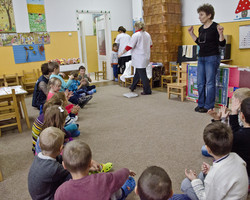Four countries pilot a joint, multisectoral response to tuberculosis (TB), HIV and viral hepatitis

WHO/Malin Bring
Following the launch in 2018 of the United Nations Common Position on Ending HIV, TB and Viral Hepatitis through Intersectoral Collaboration, Belarus, Georgia, Portugal and Tajikistan agreed to lead the way on adopting an intersectoral approach in their response to the 3 diseases.
The Common Position, signed by 14 United Nations agencies, addresses the social, economic and environmental determinants of the 3 epidemics through action in areas outside the health sector. It builds on what works in each context to address unmet needs, while systematically advancing all Sustainable Development Goals.
The 4 pilot countries have already developed some forms of cooperation between sectors, particularly with the social sector, local governance and nongovernmental organizations (NGOs) that provide different forms of support to patients suffering from these diseases or under long-term treatment. These range from providing financial aid and food aid to ensuring patients’ protection in social networks and, in some cases, supporting family members as well.
Civil society organizations are playing an increasingly important role in supporting patients and advocating for patient rights and quality of care. Global Fund grants, where available, provide significant support to NGOs and to initiatives addressing key populations.
Addressing common challenges
Together with national counterparts and in consultations with representatives of other sectors involved, WHO and Common Position partners have mapped ongoing intersectoral activities and made recommendations for next steps to address common challenges. These include:
- building bridges between programmes on HIV, TB and viral hepatitis that were previously vertical (for example, the joint one-stop testing and treatment initiative is not yet consistently in place);
- strengthening cooperation with the education sector and the media for better education in sexual and reproductive health;
- collecting more in-depth evidence on successful approaches for key populations;
- strengthening cooperation with the employment sector on creating flexible solutions to ensure employment and income generation for people who are unable to work full-time in order to break the cycle of poverty and ill health; and
- ensuring that the legal framework does not create obstacles to accessing health care.
In addition, WHO and partners are highlighting the importance of increasing public understanding that children’s health and education have a significant impact on their development. They will focus on conveying 2 key messages in particular:
- that good health and healthy lifestyles start with a good childhood and equal opportunities for development, education and the building of competencies and skills; and
- that spending in these areas is a necessary investment to build a socially cohesive society that is well equipped to cope with infectious diseases and epidemics when they occur.



